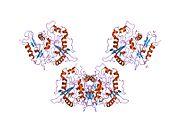Glycylpeptide N-tetradecanoyltransferase 1: Difference between revisions
Appearance
Content deleted Content added
m →Further reading: Task 7c: repair/replace et al. in cs1 author/editor parameters; |
|||
| Line 6: | Line 6: | ||
{{reflist}} |
{{reflist}} |
||
<ref name="N-myristoyltransferase in Plasmodium">{{cite journal|last1=Banerjee|first1=AK|last2=Arora|first2=N|last3=Murty|first3=U|title=Analyzing a Potential Drug Target N-Myristoyltransferase of Plasmodium falciparum Through In Silico Approaches.|journal=Journal of global infectious diseases|date=January 2012|volume=4|issue=1|pages=43-54|pmid=22529627}}</ref>==Further reading== |
|||
==Further reading== |
|||
{{refbegin | 2}} |
{{refbegin | 2}} |
||
*{{cite journal |vauthors=Rajala RV, Datla RS, Moyana TN, etal |title=N-myristoyltransferase. |journal=Mol. Cell. Biochem. |volume=204 |issue= 1–2 |pages= 135–55 |year= 2000 |pmid= 10718634 |doi=10.1023/A:1007012622030 }} |
*{{cite journal |vauthors=Rajala RV, Datla RS, Moyana TN, etal |title=N-myristoyltransferase. |journal=Mol. Cell. Biochem. |volume=204 |issue= 1–2 |pages= 135–55 |year= 2000 |pmid= 10718634 |doi=10.1023/A:1007012622030 }} |
||
Revision as of 09:58, 2 January 2016
Template:PBB Glycylpeptide N-tetradecanoyltransferase 1 also known as myristoyl-CoA:protein N-myristoyltransferase 1 (NMT-1) is an enzyme that in humans is encoded by the NMT1 gene.[1][2]
References
- ^ Duronio RJ, Reed SI, Gordon JI (May 1992). "Mutations of human myristoyl-CoA:protein N-myristoyltransferase cause temperature-sensitive myristic acid auxotrophy in Saccharomyces cerevisiae". Proc Natl Acad Sci U S A. 89 (9): 4129–33. doi:10.1073/pnas.89.9.4129. PMC 525646. PMID 1570339.
{{cite journal}}: CS1 maint: multiple names: authors list (link) - ^ "Entrez Gene: NMT1 N-myristoyltransferase 1".
[1]==Further reading==
- Rajala RV, Datla RS, Moyana TN, et al. (2000). "N-myristoyltransferase". Mol. Cell. Biochem. 204 (1–2): 135–55. doi:10.1023/A:1007012622030. PMID 10718634.
- Geyer M, Fackler OT, Peterlin BM (2001). "Structure--function relationships in HIV-1 Nef". EMBO Rep. 2 (7): 580–5. doi:10.1093/embo-reports/kve141. PMC 1083955. PMID 11463741.
{{cite journal}}: CS1 maint: multiple names: authors list (link) - Wice BM, Gordon JI (1992). "A strategy for isolation of cDNAs encoding proteins affecting human intestinal epithelial cell growth and differentiation: characterization of a novel gut-specific N-myristoylated annexin". J. Cell Biol. 116 (2): 405–22. doi:10.1083/jcb.116.2.405. PMC 2289284. PMID 1530946.
- Mumby SM, Heukeroth RO, Gordon JI, Gilman AG (1990). "G-protein alpha-subunit expression, myristoylation, and membrane association in COS cells". Proc. Natl. Acad. Sci. U.S.A. 87 (2): 728–32. doi:10.1073/pnas.87.2.728. PMC 53339. PMID 2153964.
{{cite journal}}: CS1 maint: multiple names: authors list (link) - Pal R, Reitz MS, Tschachler E, et al. (1990). "Myristoylation of gag proteins of HIV-1 plays an important role in virus assembly". AIDS Res. Hum. Retroviruses. 6 (6): 721–30. doi:10.1089/aid.1990.6.721. PMID 2194551.
- Bryant M, Ratner L (1990). "Myristoylation-dependent replication and assembly of human immunodeficiency virus 1". Proc. Natl. Acad. Sci. U.S.A. 87 (2): 523–7. doi:10.1073/pnas.87.2.523. PMC 53297. PMID 2405382.
- Tashiro A, Shoji S, Kubota Y (1990). "Antimyristoylation of the gag proteins in the human immunodeficiency virus-infected cells with N-myristoyl glycinal diethylacetal resulted in inhibition of virus production". Biochem. Biophys. Res. Commun. 165 (3): 1145–54. doi:10.1016/0006-291X(89)92722-8. PMID 2692561.
{{cite journal}}: CS1 maint: multiple names: authors list (link) - Goddard C, Aquino A, Glazer RI, Felsted RL (1989). "Chemical characterization of p17gag from human immunodeficiency virus as an N-terminally myristoylated protein". Eur. J. Biochem. 182 (2): 323–6. doi:10.1111/j.1432-1033.1989.tb14833.x. PMID 2737204.
{{cite journal}}: CS1 maint: multiple names: authors list (link) - Göttlinger HG, Sodroski JG, Haseltine WA (1989). "Role of capsid precursor processing and myristoylation in morphogenesis and infectivity of human immunodeficiency virus type 1". Proc. Natl. Acad. Sci. U.S.A. 86 (15): 5781–5. doi:10.1073/pnas.86.15.5781. PMC 297714. PMID 2788277.
{{cite journal}}: CS1 maint: multiple names: authors list (link) - Schultz AM, Henderson LE, Oroszlan S, et al. (1985). "Amino terminal myristylation of the protein kinase p60src, a retroviral transforming protein". Science. 227 (4685): 427–9. doi:10.1126/science.3917576. PMID 3917576.
- Liu J, Sessa WC (1994). "Identification of covalently bound amino-terminal myristic acid in endothelial nitric oxide synthase". J. Biol. Chem. 269 (16): 11691–4. PMID 7512951.
- Lee PP, Linial ML (1994). "Efficient particle formation can occur if the matrix domain of human immunodeficiency virus type 1 Gag is substituted by a myristylation signal". J. Virol. 68 (10): 6644–54. PMC 237085. PMID 7521919.
- Sigal CT, Zhou W, Buser CA, et al. (1995). "Amino-terminal basic residues of Src mediate membrane binding through electrostatic interaction with acidic phospholipids". Proc. Natl. Acad. Sci. U.S.A. 91 (25): 12253–7. doi:10.1073/pnas.91.25.12253. PMC 45415. PMID 7527558.
- Zhou W, Parent LJ, Wills JW, Resh MD (1994). "Identification of a membrane-binding domain within the amino-terminal region of human immunodeficiency virus type 1 Gag protein which interacts with acidic phospholipids". J. Virol. 68 (4): 2556–69. PMC 236733. PMID 8139035.
{{cite journal}}: CS1 maint: multiple names: authors list (link) - Kobayashi M, Takamatsu K, Saitoh S, Noguchi T (1993). "Myristoylation of hippocalcin is linked to its calcium-dependent membrane association properties". J. Biol. Chem. 268 (25): 18898–904. PMID 8360179.
{{cite journal}}: CS1 maint: multiple names: authors list (link) - Morikawa Y, Hinata S, Tomoda H, et al. (1996). "Complete inhibition of human immunodeficiency virus Gag myristoylation is necessary for inhibition of particle budding". J. Biol. Chem. 271 (5): 2868–73. doi:10.1074/jbc.271.5.2868. PMID 8576268.
{{cite journal}}: CS1 maint: unflagged free DOI (link) - Andersson B, Wentland MA, Ricafrente JY, et al. (1996). "A "double adaptor" method for improved shotgun library construction". Anal. Biochem. 236 (1): 107–13. doi:10.1006/abio.1996.0138. PMID 8619474.
- Zhou W, Resh MD (1997). "Differential membrane binding of the human immunodeficiency virus type 1 matrix protein". J. Virol. 70 (12): 8540–8. PMC 190946. PMID 8970978.
- Yu W, Andersson B, Worley KC, et al. (1997). "Large-scale concatenation cDNA sequencing". Genome Res. 7 (4): 353–8. doi:10.1101/gr.7.4.353. PMC 139146. PMID 9110174.

